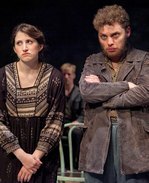SITE GUIDE
SEARCH
REVIEWS
REVIEW ARCHIVES
ADVERTISING AT CURTAINUP
FEATURES
NEWS
Etcetera and
Short Term Listings
LISTINGS
Broadway
Off-Broadway
NYC Restaurants
BOOKS and CDs
OTHER PLACES
Berkshires
London
California
New Jersey
DC
Connecticut
Philadelphia
Elsewhere
QUOTES
TKTS
PLAYWRIGHTS' ALBUMS
LETTERS TO EDITOR
FILM
LINKS
MISCELLANEOUS
Free Updates
Masthead
A CurtainUp DC Review
Our Class
|
“This is what is most important, that the audience is forced to confront the most difficult question: what might I have done in this situation?” — Playwright Tadeusz Slobodzianek “What could any of us have done?”— Abram, a Jew who emigrated from Poland to the United States in 1937. |

Dana Levanovsky and Joshua Morgan
(Photo: C. Stanley) |
Our Class follows five Poles and five Jews (interestingly the Jews are never referred to as Polish Jews or Jewish Poles) from their carefree childhood until death. What happened to them between 1926 and 2003 is told in scenes called Lessons, numbered on a blackboard. While each character has a story to tell, their veracity differs. Some members of the class diligently trim their personal history to suit the prevailing politics of the time.
The spectre of anti-Semitism was always present in Poland but the children, singing and dancing in school to charming and uplifting Polish folk songs, seemed carefree. Their ambitions were, for the most part, modest – to be a tractor driver, a butcher -- although one of the girls dreamt of being a movie star. Because fate made them live in a country that was invaded by the Soviets, the Germans and then again the Soviets, their lives turned into schemes of survival. Religion was a powerful motivator but so was money.
Perhaps the most astonishing aspect of the country’s history is not that it put a spin on its past. At first we are led to believe that the massacre at Jedwabne where prisoners held in a barn were burned to death was led by Nazis. It was not. The massacre was conducted by the people of the town. Catholics and Jews, opposing one another, knew their enemies well.
Religion takes a beating as the duplicity and lack of morality enfolds through the character of Heniek, played byAlexander Strain in a strong performance, who works his way up the Catholic hierarchy. The more egregious characters who have survived the political shuffles, suffer great personal losses later in life. Who is the most depraved? Possibly the egregious Zygmunt, played with vicious zeal by Mark Krawczyk, while Menachem, Tim Getman, is nothing more than a womanizer and a crook.
The most sympathetic character, Jakub Katz, a Jew, is given a very gentle and endearing performance by Ashley Ivey. He is the first of the group to be murdered. Abram, played with convincing rabbinical and cantorial flourish by Sasha Olinick, is able to practice his faith and procreate many more Jews, by emigrating from Poland to the U.S. in 1937. As the mismatched Jewish/Catholic couple, Joshua Morgan as Wladek and Dana Levanovsky as Rachelka/Marianna, a formidable survivor who converted to Christianity, provide a sweetness wrapped in irony.
Director Derek Goldman has corralled his cast into a superb example of ensemble acting. While each character is distinct, they work together well, as they sourt out the pieces of a difficult but engaging puzzle. In a heart-breaking yet mesmerizing performance, Dana Levanosky as Rachelka/Marianna, is fortunate to have the best lines but what she does with them is splendid. Overcome by weltschmerz, her sense of irony prevails and her portrayal of the aging survivor seems very authentic.
At the beginning of the first act, the children in Our Class dance and move in a carefree manner ably choreographed by Emma Crane Jaster. Heather Haney as Zocha gives a convincing interpretation of a horse. In a different kind of movement, Laura C. Harris’s cradling of her baby is particularly effective. As the piece progresses, folk dancing is replaced by tough physical altercations, choreographed with speed and authenticity by Joe Isenberg. Harlan Work, who looks like a Pole, as Rysiek, portrays violence very effectively. Misha Kachman’s set – painted brick walls and simple chairs evoke the simplicity of a pre-war mittel European village. It is given just the right amount of moodiness by lighting designer Daniel MacLean Wagner.
Our Class is thought-provoking theatre, exceptionally well directed and performed, with a resonance that continues long after the lights go down. What might I have done in the circumstances members of Our Class faced? I’m thinking and that’s the point.
To read a review of another production of this play by our London critic go here.
|
Our Class by Tadeusz Slobodzianek English version by Ryan Craig Directed by Derek Goldman Cast: Tim Getman (Menachem); Heather Haney (Zocha); Laura C. Harris (Dora); Alexander Strain (Heniek); Mark Krawczyk (Zygmunt); Dana Levanovsky (Rachelka/Marianna); Joshua Morgan (W?adek); Sasha Olinick (Abram); Ashley Ivey (Jakub Katz); Harlan Work (Rysiek). Scenic Designer, Misha Kachman Lighting Designer, Daniel MacLean Wagner Costume Designer, Ivania Stack Sound Designer, James Bigbee Garver Choreographer, Emma Crane Jaster Fight Choreographer, Joe Isenberg Running time: 3 hours with one 15-minute intermission. Performances October 10 to November 4, 2012. Tickets from $35. Theater J, Washington DC Jewish Community Center, 1529 16th Street, NW, Washington, DC. 202-777-3230, theaterj.org. Review by Susan Davidson based on October 15, 2012 performance. REVIEW FEEDBACK Highlight one of the responses below and click "copy" or"CTRL+C"
For a feed to reviews and features as they are posted add http://curtainupnewlinks.blogspot.com to your reader Curtainup at Facebook . . . Curtainup at Twitter Subscribe to our FREE email updates: E-mail: esommer@curtainup.comesommer@curtainup.com put SUBSCRIBE CURTAINUP EMAIL UPDATE in the subject line and your full name and email address in the body of the message |


 Book of Mormon -CD
Book of Mormon -CD